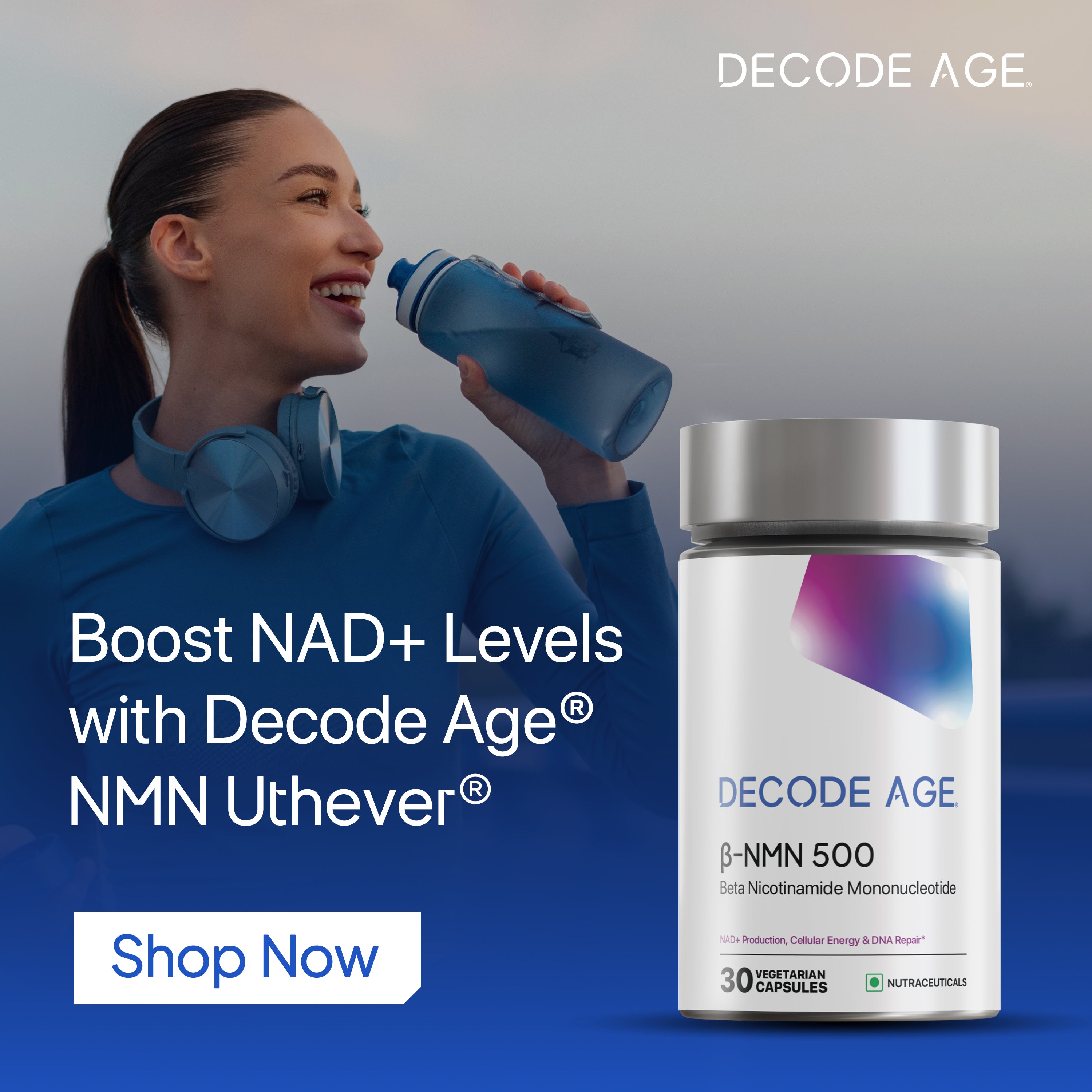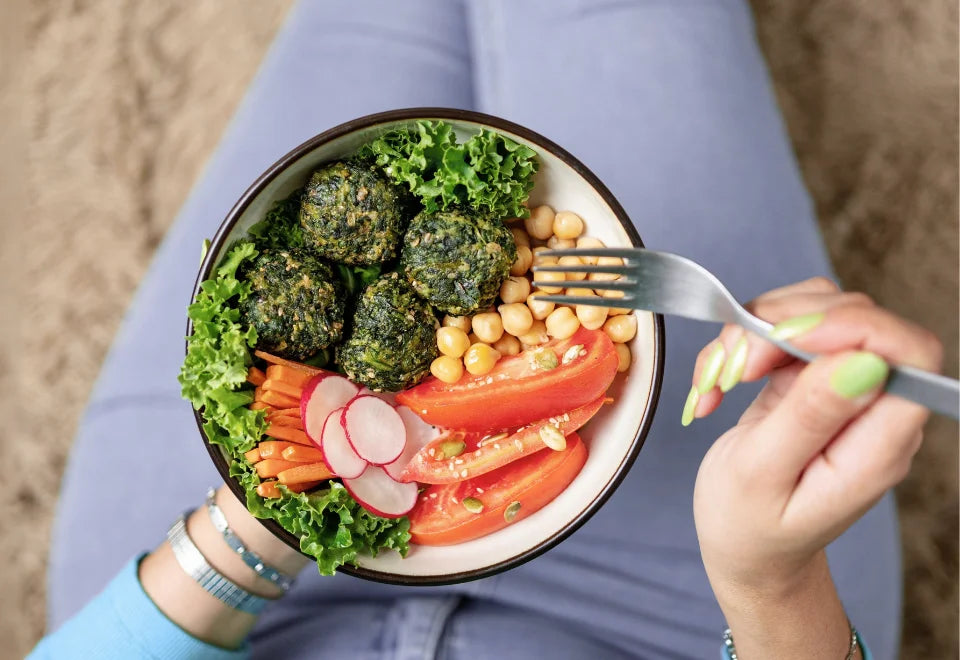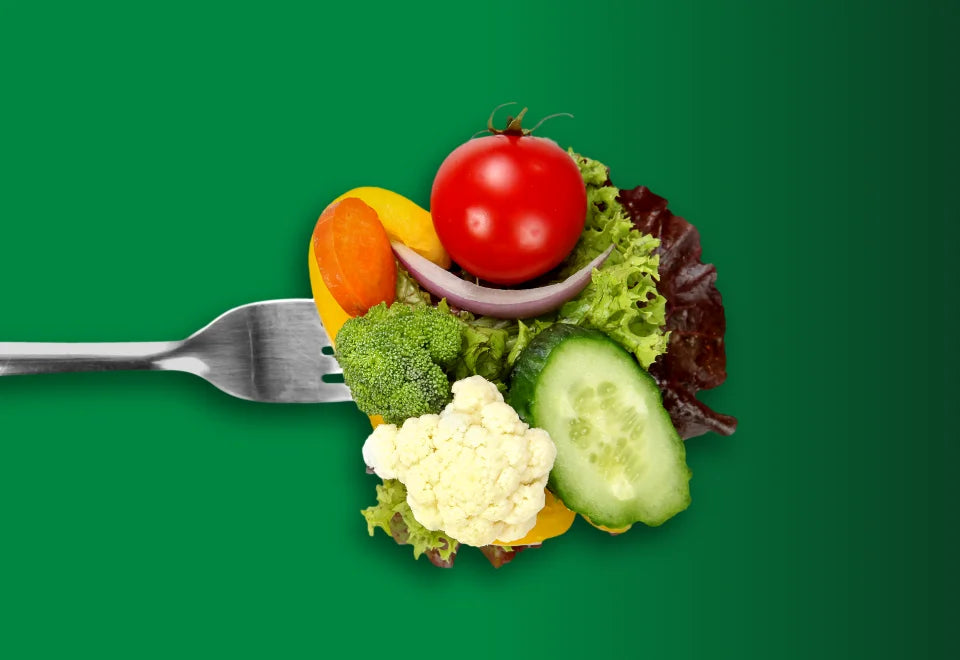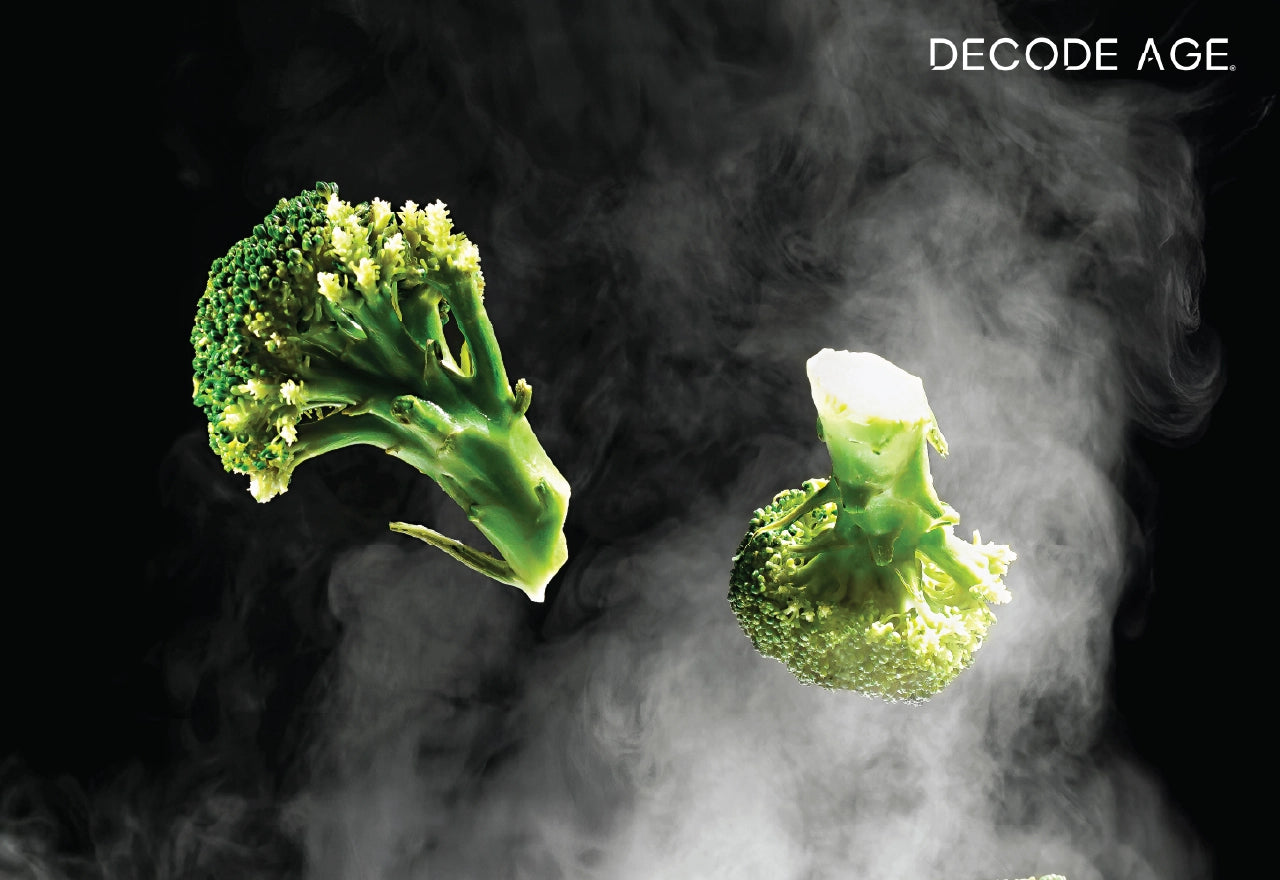Nicotinamide mononucleotide (NMN) is a key precursor to NAD+ (nicotinamide adenine dinucleotide), a coenzyme essential for DNA repair, energy metabolism, and longevity. As NAD+ levels decline with age, boosting them through NMN intake can support anti-ageing and metabolic health.
While supplements like Decode Age NMN and LongeVit are popular that act as easy substitutes, nature also provides potent sources of NMN in certain vegetables, fruits, and legumes.
The Science Behind NMN
NMN has been gaining attention as a promising anti-ageing product. It is a precursor of NAD+ and increases NAD+ levels. While NMN is mostly found in the nucleus, mitochondria, and cytoplasm, it is also present in placenta tissue and bodily fluids including blood and urine in humans. NMN was once thought to be solely a source of cellular energy and an intermediate in NAD+ biosynthesis, the scientific community is now more aware of NMN's anti-ageing properties, pharmacological activities linked to the restoration of NAD+, and a host of other health benefits.
Therefore, NMN has therapeutic effects on a variety of diseases, such as obesity, age-induced type 2 diabetes, cerebral and cardiac ischemia, heart failure, cardiomyopathies, Alzheimer's disease, and other neurodegenerative disorders, acute kidney injury, alcoholic liver disease, corneal injury, macular degeneration, and retinal degeneration due to its influence on cellular energy, sirtuins, and redox homeostasis.
What Is the Most Effective Way to Increase NMN?
It has been demonstrated that NMN increases NAD+ levels and slows down the ageing process, but is it possible to raise NMN levels naturally?
As we age, the NAD+ levels in our body decline. To increase NAD+ levels, NMN supplements should be taken. One of NAD+'s precursors, like NMN, is required to feed NAD+. Many foods, including edamame, broccoli, cabbage, cucumbers, and avocados, naturally contain this. According to a 2016 study, the NMN content of vegetables like cabbage and cucumber ranges from 0.25 to 1.88 mg per 100g. Tomato and avocado fruits have likewise been found to have 0.26 to 1.60 mg per 100g. Conversely, raw beef, meat, and prawns have relatively lower quantities of NMN—between 0.06 and 0.42 mg/100g. Therefore, consuming a lot of these could raise your NMN levels naturally.
How to Include NMN Foods in Your Diet
Although NMN isn't present in massive quantities, consistent intake of NMN-supportive foods helps maintain baseline NAD+ levels. Including a variety of NMN-rich vegetables, fruits, and legumes regularly in meals can create a cumulative effect, gradually enhancing cellular function over time. Moreover, these foods often carry additional benefits such as fiber, antioxidants, and polyphenols, which further contribute to reducing oxidative stress and supporting overall longevity. Regular dietary habits incorporating such foods ensure a natural, sustainable way to nourish cells and promote healthy ageing without solely relying on supplements. Here are key NMN-rich foods to add:
- Broccoli and Cabbage- About 0.25-1.12mg and 0.00-0.90mg of NMN are present in both veggies, respectively. These cruciferous vegetables are nutrient powerhouses, rich in vitamins C and K, fiber, and powerful antioxidants like sulforaphane. Broccoli sprouts, in particular, have been shown to significantly boost NAD+ levels. Both vegetables are well-known for their anti-inflammatory properties and their ability to combat oxidative stress. Regular consumption supports DNA repair, improves detoxification pathways, and may even contribute to reduced cancer risk.
- Tomatoes- Tomatoes are a versatile source of NMN (every 100g of tomatoes contain 0.26-0.30mg of NMN) and come loaded with essential nutrients like vitamins A, K, and C, potassium, and folate. Lycopene, the compound behind their red colour, is a potent antioxidant that supports heart health, reduces LDL oxidation, and may help protect against certain cancers. Consuming tomatoes raw or lightly cooked enhances NMN intake while preserving their antioxidant content.
- Avocado- Known as a superfood, avocados offer one of the highest natural sources of NMN (0.36-1.60 mg/100g). They are rich in monounsaturated fats (healthy fats), fiber, and vitamins C, E, K, and B6, making them excellent for supporting cardiovascular health and skin vitality. The high potassium and folate content further supports nerve function and cell repair, making avocados a strong ally for those looking to naturally enhance longevity.
- Mushrooms- While mushrooms contain modest NMN levels (~0.001 mg/100g), their benefits extend far beyond that. They're rich in beta-glucans, compounds known to enhance gut microbiota and support immune defense. Shiitake and enoki mushrooms also provide ergothioneine, a unique antioxidant that helps reduce oxidative stress and inflammation, contributing to healthy ageing and improved metabolic function.
- Edamame- These young soybeans are a standout plant-based source of NMN (0.37–1.68 mg per 100g) and are loaded with nutrients like vitamins A, K, B6, folate, calcium, magnesium, zinc, and niacin (another NAD+ precursor). Edamame supports cognitive function, heart health, and helps combat oxidative stress. It also contains isoflavones, which have anti-inflammatory properties and may support hormonal balance.
Benefits of Consuming NMN-Rich Foods
Incorporating NMN-rich foods into your diet offers more than just increased NAD+ production. These foods help counteract age-related decline, enhance energy production, and support overall cellular health. Including foods high in NMN in your diet may have the following possible advantages:
Boosts NAD+ levels
One of NMN’s most direct benefits is its ability to boost NAD+ levels in the body. NAD+ is a coenzyme involved in countless cellular processes, especially energy metabolism. NMN is converted into NAD+ through the NMNAT (nicotinamide mononucleotide adenylyltransferases) enzymes, and this elevated NAD+ supports healthy mitochondrial function, enhances cellular respiration, and improves stamina and vitality across age groups.
Supports DNA Repair
As we age, DNA damage accumulates due to oxidative stress and environmental factors. NAD+ is vital for the function of PARP1, an enzyme that repairs damaged DNA strands. NMN helps elevate NAD+ levels, allowing PARP1 to repair DNA more efficiently and prevent mutation accumulation and premature cellular ageing.
Maintains Telomere Length
Telomeres protect chromosome ends from deterioration and fusion. Over time, telomere length decreases and signal cellular ageing. NMN plays a role in preserving telomere length, particularly by boosting NAD+ which supports telomere-binding proteins and repair pathways. Animal studies have shown that NMN supplementation helps reduce telomere loss and fibrosis in liver cells (Niu et al., 2021), contributing to longevity.
Promotes Heart Health
The heart relies heavily on energy and proper mitochondrial function. NMN-derived NAD+ activates the SIRT1/FOXO1 pathway, which guards against oxidative stress and cell damage in heart tissues. This function is critical in preventing ischemia/reperfusion injury and age-related cardiac conditions such as heart failure and arrhythmias (Yamamoto et al., 2014).
Improves Metabolic Health
Metabolic decline is common with ageing and can lead to obesity, insulin resistance, and type 2 diabetes. NMN improves mitochondrial function and boosts energy output, helping regulate glucose and lipid metabolism. NAD+ also activates sirtuins that improve insulin sensitivity, making NMN a promising candidate for managing metabolic disorders.
Activates Sirtuins
Sirtuins (SIRT1–7) are a group of proteins that regulate cellular health, ageing, inflammation, and metabolism. Their activity depends on NAD+. NMN supplementation ensures adequate NAD+ levels, which in turn boosts sirtuin activity. This activation promotes stress resistance, DNA stability, and cellular longevity, offering a systemic benefit to organ health.
Antioxidant Defense
Antioxidants are substances that fight against oxidative stress and eliminate ROS. NMN helps combat oxidative damage by suppressing NOX1 and NOX4 enzymes, both of which generate harmful reactive oxygen species (ROS). Elevated NAD+ levels support mitochondrial resilience and minimize cellular apoptosis, protecting tissues from long-term damage (Salminen et al., 2008).
Best NMN Supplements for Longevity
Decode Age Uthever® NMN stands out as a clinically proven and highly effective supplement. Supported by a rigorous multicenter study, it demonstrated significant benefits in middle-aged and older adults, with a remarkable 38% increase in NAD+/NADH levels over 60 days, surpassing the placebo group.
Decode Uthever® NMN uses high-quality NMN with 99% purity, confirmed through advanced lab testing methods like NMR and LC-MS. It contains the active β- form of NMN, which is the kind your body can use. Decode Age ensures quality by working with third-party labs and top research institutions, making it a safe and reliable choice for those looking to boost their energy and slow ageing naturally.
Supplements vs. Natural Sources
The debate between supplements and natural food sources for nutrients is ongoing, with each presenting unique benefits and drawbacks. The choice often hinges on individual lifestyle, food preferences, and health needs. Natural sources, derived from whole foods, offer a holistic approach to nutrition. Rich in essential vitamins, minerals, fiber, and phytonutrients, they support overall health in a complex matrix readily absorbed by the body. Plants and animals provide crucial sources, delivering proteins, carbohydrates, and other vital nutrients.
On the other hand, supplements, available in various forms, contain concentrated vitamins, minerals, herbs, and amino acids. They fill nutritional gaps but lack the diverse matrix found in whole foods. Notably, NMN supplements are essential, as sufficient amounts are not obtained from regular diets. While some supplements, like vitamin D or probiotics, exhibit strong effects, it's crucial to note their nutritional information for proper usage. In the end, the decision between supplements and natural sources is a personal one, balancing convenience and nutritional richness for a comprehensive approach to well-being.
|
Aspect |
Natural Foods |
NMN Supplements |
|
Accessibility |
Widely available |
Needs purchase |
|
Bioavailability |
Lower, but combined with cofactors |
High and targeted |
|
Convenience |
Needs dietary planning |
Easy to consume daily |
|
Other Nutrients |
Rich in fiber, antioxidants |
Pure NMN only |
Conclusion
To sum up, nicotinamide mononucleotide (NMN) has a lot of potential as an anti-ageing medication since it raises NAD+ levels and has a number of other health advantages. Although NMN is found naturally in foods like edamame, broccoli, cabbage, tomatoes, avocados, and mushrooms, supplements like LongeVit and Decode Age NMN are designed to extend life. These supplements provide a practical substitute for natural sources and are supported by scientific studies. Depending on personal preferences, way of life, and medical requirements, one may choose between supplements and natural sources. Whichever route is selected, sustaining sufficient NAD+ levels through NMN-rich diets or supplements may enhance general health and possibly lengthen life expectancy.
FAQs
Are there any side effects associated with increasing NMN intake through diet or supplements?
There's not much evidence that taking more NMN pills or through diet will have negative impacts. Individual reactions, however, could differ. Before taking, it's best to speak with a healthcare provider to be sure you're safe and getting the best advice possible. Mainly people with medications, who are pregnant, breastfeeding, and have severe issues such as hypertension, cardiovascular issues, etc.,
Can you get NMN naturally?
Yes, including foods like broccoli, cabbage, tomatoes, avocados, mushrooms, and edamame into your diet can naturally increase your NMN levels. These foods provide precursors and co-factors for NAD+ production. Alternatively, maintaining a healthy lifestyle and balanced diet supports overall cellular health and may indirectly boost NMN levels.
What are the best natural NMN sources?
Shiitake mushrooms, broccoli, cabbage and edamame are the highest sources of natural NMN.
What foods/fruits have NMN molecules?
Mushrooms, broccoli, cabbage, tomatoes, cucumbers, potatoes, oranges, and avocados are the highest sources of natural NMN.
Are NMN Supplements Safe?
Yes, NMN supplements are generally considered safe. They increase NAD+ levels and promote various health benefits. However, individuals with specific health conditions or those pregnant or breastfeeding should consult a healthcare professional before starting any supplement regimen.






























Leave a comment
All comments are moderated before being published.
This site is protected by hCaptcha and the hCaptcha Privacy Policy and Terms of Service apply.